苏教版新译林英语7年级上册语法总结
七年级上册英语知识点译林

七年级上册英语知识点译林七年级上册英语是学习英语的基础,因此,理解和掌握其中的知识点至关重要。
本文将为大家介绍七年级上册英语的知识点译林,帮助大家在学习中更好地理解和掌握相关知识。
一、基本句型1. 简单句简单句是由主语和谓语构成的句子。
例如:I am a student.She likes apples.2. 复合句复合句由一个主句和一个或多个从句构成。
例如:I know that you are a good student.She said that she likes apples.3. 疑问句疑问句是用来问问题的句子。
例如:Do you like apples?What is your name?4. 祈使句祈使句是用来表示命令、请求、建议、警告等的句子。
例如:Help me with my homework.Please give me a glass of water.二、时态1. 一般现在时一般现在时用于描述经常性的动作或事实。
例如:I often go to school by bus.She likes to read books.2. 一般过去时一般过去时用于描述已经发生的事情。
例如:I watched a movie last night.She visited her grandparents yesterday.3. 现在进行时现在进行时用于描述正在进行的动作。
例如:I am studying English.She is playing basketball.4. 将来时将来时用于描述将来要发生的事情。
例如:I will go to the concert next week.She is going to visit her parents next month.三、词汇1. 名词名词是指人、事物、地点等具体物品或抽象概念。
例如:I have a pen.She is a good student.2. 动词动词是指表示动作或状态的词语。
译林版七年级上册英语知识点归纳
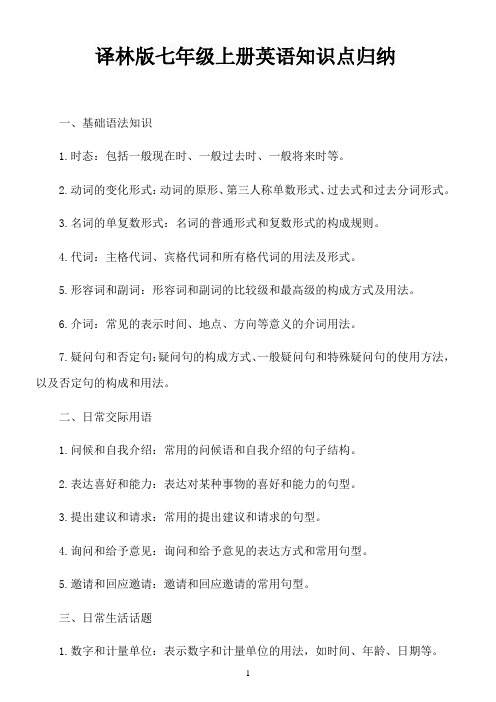
译林版七年级上册英语知识点归纳一、基础语法知识1.时态:包括一般现在时、一般过去时、一般将来时等。
2.动词的变化形式:动词的原形、第三人称单数形式、过去式和过去分词形式。
3.名词的单复数形式:名词的普通形式和复数形式的构成规则。
4.代词:主格代词、宾格代词和所有格代词的用法及形式。
5.形容词和副词:形容词和副词的比较级和最高级的构成方式及用法。
6.介词:常见的表示时间、地点、方向等意义的介词用法。
7.疑问句和否定句:疑问句的构成方式、一般疑问句和特殊疑问句的使用方法,以及否定句的构成和用法。
二、日常交际用语1.问候和自我介绍:常用的问候语和自我介绍的句子结构。
2.表达喜好和能力:表达对某种事物的喜好和能力的句型。
3.提出建议和请求:常用的提出建议和请求的句型。
4.询问和给予意见:询问和给予意见的表达方式和常用句型。
5.邀请和回应邀请:邀请和回应邀请的常用句型。
三、日常生活话题1.数字和计量单位:表示数字和计量单位的用法,如时间、年龄、日期等。
2.学校生活:学校相关的词汇和句子,如课程安排、校园设施等。
3.家庭成员和职业:家庭成员的称呼和常见职业的英文表达。
4.食物和饮料:常见食物和饮料的名称及描述。
5.时间和活动:描述日常活动的词汇和句子,如日常作息、爱好等。
6.交通工具和旅行:常见交通工具的名称和旅行相关的词汇。
7.购物和支付:购物场景中常用的词汇和句子,如购物用语、货币单位等。
四、阅读理解技巧1.主旨概括:通过阅读文章,抓住文章的主旨和中心思想。
2.推理判断:根据文章中的信息进行推理和判断。
3.词汇猜测:通过上下文的提示,猜测词语的意思。
4.阅读策略:如扫读、略读等阅读技巧的应用。
以上是《译林版七年级上册英语知识点归纳》的简要总结。
希望同学们能够根据这些知识点进行系统学习和复习,提高自己的英语水平。
同时,建议同学们多做练习题和阅读理解,以加深对知识点的理解和运用。
译林版七年级英语上册语法知识点总结

译林版七年级英语上册语法知识点总结一、名词1. 名词的分类- 可数名词(Countable nouns):表示可以数的事物,如:boy, pen, book.- 不可数名词(Uncountable nouns):表示无法数的事物,如:water, rice, paper.2. 名词所有格- 单数名词所有格:在名词后加's,如:Tom's book.- 复数名词所有格:在名词后加's,如:the students' books.- 不可数名词所有格:通常用of表示,如:a piece of paper.二、代词1. 人称代词- 主格代词(Subject pronouns):I, you, he, she, it, we, they.- 宾格代词(Object pronouns):me, you, him, her, it, us, them.2. 物主代词- 形容词性物主代词(Adjective possessives):my, your, his, her, its, our, their.- 名词性物主代词(Noun possessives):mine, yours, his, hers, its, ours, theirs.3. 不定代词- 所有人称:somebody, someone, something, somewhere, sometimes.- 所有人称否定:nobody, no one, nothing, nowhere, never.三、形容词和副词1. 形容词- 形容词用来修饰名词,如:big, small, happy, sad.- 形容词比较级:在形容词后加-er,如:bigger.- 形容词最高级:在形容词后加-est,如:biggest.2. 副词- 副词用来修饰动词、形容词、其他副词或整个句子,如:quickly, slowly, never, always.- 副词比较级:在副词后加-er,如:quicklier.- 副词最高级:在副词后加-est,如:quickliest.四、动词1. 动词的分类- 行为动词(ral verbs):表示动作或状态,如:eat, drink, read.- 系动词(Link verbs):表示主语的状态,如:be, seem, look.2. 动词时态- 一般现在时(Present Simple):描述惯性动作或普遍真理,如:I like apples.- 现在进行时(Present Continuous):描述正在进行的动作,如:She is reading a book.- 现在完成时(Present Perfect):描述过去发生的动作对现在造成的影响,如:I have finished my homework.五、冠词1. 不定冠词- a, an:用于第一次提到的或不特定的名词,如:a book, an apple.2. 定冠词- the:用于特定的或已知的名词,如:the table, the girl.六、介词1. 常见介词- in, on, at, by, with, under, over, een, among.2. 介词短语- look after(照顾),look for(寻找),put on(穿上),take off(脱下).七、句子结构1. 简单句- 主语(Subject)+ 谓语(Verb)+ 宾语(Object),如:She reads a book.2. 复合句八、疑问句1. 一般疑问句- 是否疑问句:Do you like apples?- 存在疑问句:Is there a book on the table?2. 特殊疑问句- 特殊疑问词+ 动词+ 其他,如:What is your name?以上是译林版七年级英语上册的主要语法知识点总结,希望对您有所帮助。
七年级英语译林版上知识点
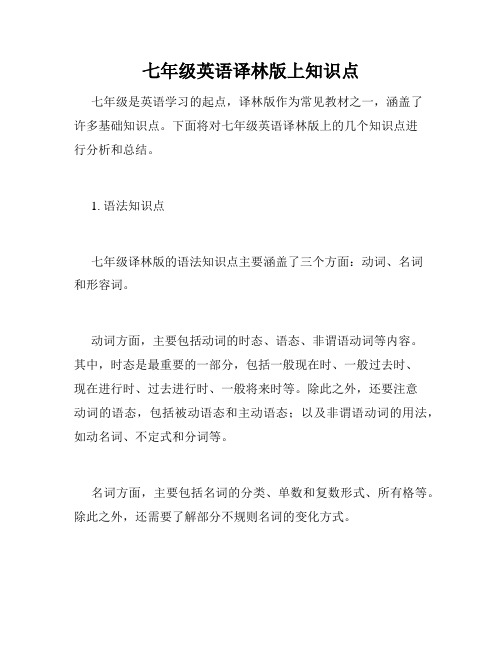
七年级英语译林版上知识点七年级是英语学习的起点,译林版作为常见教材之一,涵盖了许多基础知识点。
下面将对七年级英语译林版上的几个知识点进行分析和总结。
1. 语法知识点七年级译林版的语法知识点主要涵盖了三个方面:动词、名词和形容词。
动词方面,主要包括动词的时态、语态、非谓语动词等内容。
其中,时态是最重要的一部分,包括一般现在时、一般过去时、现在进行时、过去进行时、一般将来时等。
除此之外,还要注意动词的语态,包括被动语态和主动语态;以及非谓语动词的用法,如动名词、不定式和分词等。
名词方面,主要包括名词的分类、单数和复数形式、所有格等。
除此之外,还需要了解部分不规则名词的变化方式。
形容词方面,需要掌握形容词的基本语法用法,如形容词的比较级和最高级、形容词修饰名词的位置等。
2. 词汇知识点词汇方面是语言学习的一个重要方面,也是构建语言能力的基础。
在七年级译林版上,需要了解基础的英语词汇,如基本的日常用语、数字、颜色及一些具有代表性的英语单词等。
此外,还需要掌握一些基本的短语和固定搭配,包括常用动词短语、介词短语、副词短语、疑问词及其简单用法等。
3. 交际语言知识点交际语言是指在日常生活和交往中使用的语言,主要用于表达自己的想法和情感,以及了解别人的意见和感受。
在七年级译林版上,需要掌握一些基础的交际语言技巧。
常见的交际用语包括问候语、礼貌用语、询问和回答的基本表达方式、道歉和感谢等。
4. 阅读技巧知识点阅读技巧是指在阅读中运用的一系列技巧,旨在提高阅读效率和理解能力。
在七年级译林版上,需要了解一些基本的阅读技巧。
例如,掌握查找关键词、理解文章主旨、辨别信息的能力等。
此外,还需要学会运用记笔记和批注等技巧。
总结七年级英语译林版的知识点分析表明,语法、词汇、交际语言和阅读技巧是基础知识的主要方面。
掌握这些知识点的基本内容对于英语学习和应用有着重要的意义。
可以通过多读、多听、多说和多写等途径来提升自己的英语能力,让自己进一步了解和掌握英语这门语言。
英语初一上册语法知识点总结译林
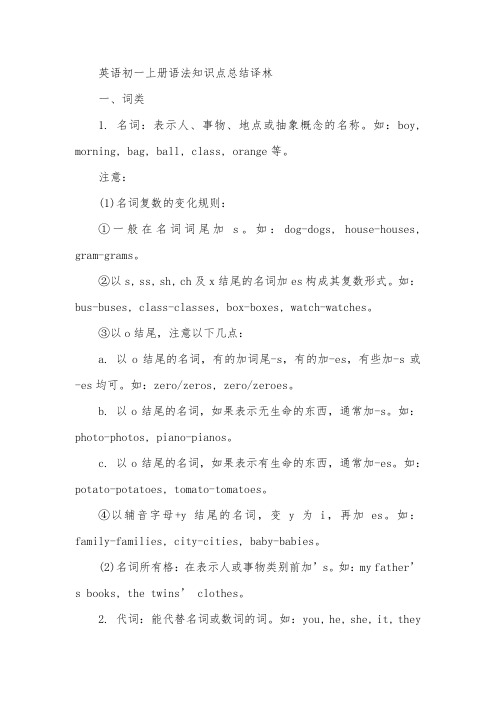
英语初一上册语法知识点总结译林一、词类1. 名词:表示人、事物、地点或抽象概念的名称。
如:boy, morning, bag, ball, class, orange等。
注意:(1)名词复数的变化规则:①一般在名词词尾加s。
如:dog-dogs, house-houses, gram-grams。
②以s, ss, sh, ch及x结尾的名词加es构成其复数形式。
如:bus-buses, class-classes, box-boxes, watch-watches。
③以o结尾,注意以下几点:a. 以o结尾的名词,有的加词尾-s,有的加-es,有些加-s或-es均可。
如:zero/zeros, zero/zeroes。
b. 以o结尾的名词,如果表示无生命的东西,通常加-s。
如:photo-photos, piano-pianos。
c. 以o结尾的名词,如果表示有生命的东西,通常加-es。
如:potato-potatoes, tomato-tomatoes。
④以辅音字母+y结尾的名词,变y为i,再加es。
如:family-families, city-cities, baby-babies。
(2)名词所有格:在表示人或事物类别前加’s。
如:my father’s books, the twins’ clothes。
2. 代词:能代替名词或数词的词。
如:you, he, she, it, they等。
注意:(1)人称代词主格和宾格的用法:主格作主语,宾格作宾语。
如:He is Chinese. (主格) Let me help you.(宾格)(2)物主代词的用法:形容词性物主代词后面一定要跟名词,名词性物主代词可作主语、宾语和表语。
如:This is my book.(形容词性) These books are theirs.(名词性)(3)反身代词的用法:表示“自己”,既可作宾语,又可作同位语。
如:He can do it himself.(作宾语) Himself is an excellent student.(作同位语)3. 动词:表示动作或状态的词。
(完整版)苏教版新译林英语7年级上册语法总结
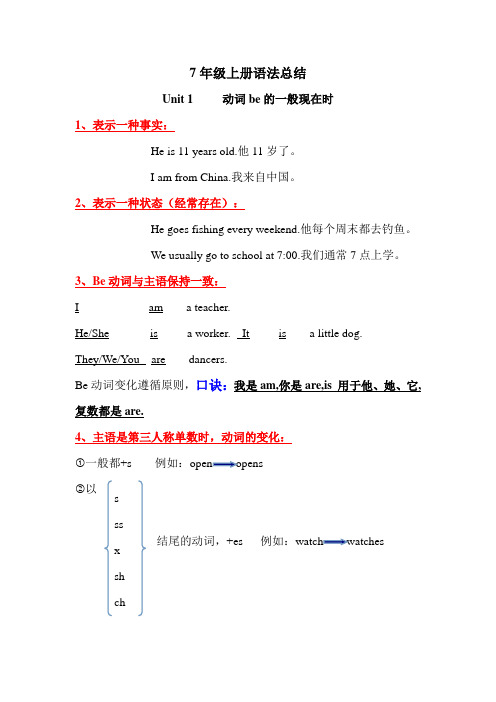
7年级上册语法总结Unit 1 动词be 的一般现在时1、表示一种事实:He is 11 years old.他11岁了。
I am from China.我来自中国。
2、表示一种状态(经常存在):He goes fishing every weekend.他每个周末都去钓鱼。
We usually go to school at 7:00.我们通常7点上学。
3、Be 动词与主语保持一致: I am a teacher.He/She is a worker. It is a little dog. They/We/You are dancers.Be 动词变化遵循原则,口诀:我是am,你是are,is 用于他、她、它,复数都是are.4、主语是第三人称单数时,动词的变化: ①一般都+s 例如:②以结尾的动词,+es 例如:watch watchessssxshch③ 辅音字母+y 结尾的动词,ies 例如:④辅音字母+o 结尾的动词,+es 例如:goes5、一般现在时的句型转换 ①否定句be+notShe is in the kitchen.~She is not in the kitchen.They are in the classroom.~They are not in the classroom. ②一般疑问句be 提前She is in the kitchen.~Is she in the kitchen?——Yes ,she is. ——No ,she isn ’t. They are in the classroom.~Are they in the classroom ? ——Yes ,they are. ——No ,they aren ’t.Unit 2 行为动词的一般现在时1、行为动词形式变化2、句型转换①否定句:do+not/does +notYou don’t go to school on Sunday.He doesn’t work in this shop.②句首添加do/doesDo you play basketball after school?Does John speak Chinese?Unit 3 人称代词1、我们常用人称代词表示人或物2、人称代词主格、宾格形式3、主格在句中做主语,一般用在动词前宾格在句中做宾语,一般用在动词、介词后4、有好几个人称代词并列出现时,顺序如下:单数:231原则——you、he and I复数:123原则——we、you and theyUnit 4 表示时间的介词in、on、at频度副词:always>usually>often>sometimes>seldom>neverUnit 5 特殊疑问句注意:when和what time的区别What time询问的是具体时间,when可以是具体时间也可以是大体时间。
(完整版)苏教版新译林英语7年级上册语法总结
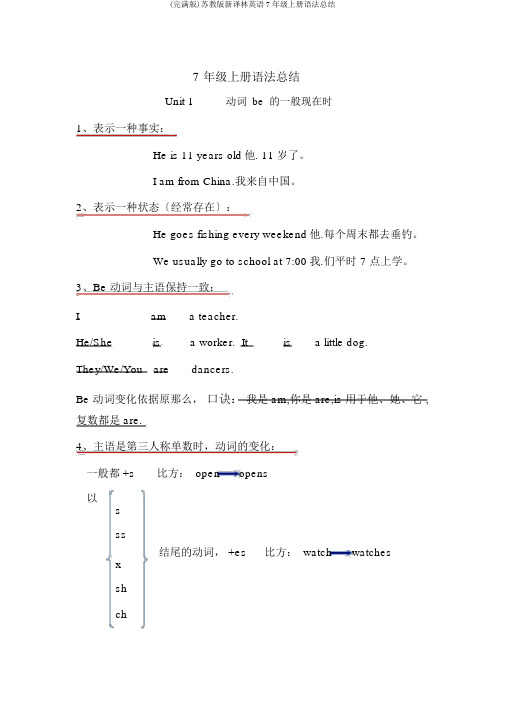
7年级上册语法总结Unit 1动词be的一般现在时1、表示一种事实:He is 11 years old他. 11 岁了。
I am from China.我来自中国。
2、表示一种状态〔经常存在〕:He goes fishing every weekend他.每个周末都去垂钓。
We usually go to school at 7:00我.们平时 7 点上学。
3、Be 动词与主语保持一致:I am a teacher.He/She is a worker. It is a little dog.They/We/You are dancers.Be 动词变化依据原那么,口诀:我是 am,你是 are,is 用于他、她、它 , 复数都是 are.4、主语是第三人称单数时,动词的变化:一般都 +s比方:open opens以sss结尾的动词, +es比方:watch watches xshch辅音字母 +y 结尾的动词, y ies比方:study studies④辅音字母 +o 结尾的动词, +es比方:go goes5、一般现在时的句型变换否认句 be+notShe is in the kitchen.~She is not in the kitchen.They are in the classroom.~Theyare not in the classroom.一般疑问句 be 提前She is in the kitchen.~Is she in the kitchen?—— Yes,she is.—— No,she isn’t.They are in the classroom.~Are they in the classroom?—— Yes,they are.—— No,they aren’t.Unit 2行为动词的一般现在时用法例句I go to school at 7:00 every morning.经常性、习惯性的动作The earth moves around the sun客观事实目前的爱好、能力等She sings very well.1、行为动词形式变化主语行为动词第一人称复数〔we〕/第二人称复原形数〔you〕/第三人称复数〔They〕例句We do our homeworkat home.You have lunch at school. They play basketball after school.第三人称单数〔 He、She、It 〕2、句型变换否认句: do+not/does +not 第三人称单She does her 数homework in theevening.You don’tgo to school on Sunday.He doesn’twork in this shop.句首增加 do/doesDo you play basketball after school?Does John speak Chinese?Unit 3人称代词1、我们常用人称代词表示人或物2、人称代词主格、宾格形式单数复数主格宾格主格宾格第一人称I Me We Us第二人称You You You YouHe Him They Them 第三人称She HerIt It3、主格在句中做主语,一般用在动词前宾格在句中做宾语,一般用在动词、介词后4、有好几个人称代词并列出现时,序次以下:单数: 231 原那么—— you、he and I复数: 123 原那么—— we、you and theyUnit 4表示时间的介词 in、on、at介词用法例子in一天中的早 /中/晚 In the morning/afternoon/evening月份In January/February/March/April季节In Spring/Summer/Autumn/Winter年份In 2021/2021on星期On Sunday/Monday/Tuesday某一天On 1 September某一天的早 /中/晚 On a cold morning/Sunday afternoon特定节日 /一天On Children’s Dayat某一时辰At 8:00年龄At 12 years old频度副词:always>usually>often>sometimes>seldom>neverUnit 5特别疑问句特别疑问词含义例句what什么What‘s your name?Class/grade哪个班级、年级What class/grade are you in? what colour什么颜色What colour do you like?time几点What time is it?when什么时候When do you usually get up? where哪里Where do you live?who谁Who is the man in a blue sweater?why为什么Why are you always late for school?whose谁的Whose pen is this?which哪一个Which is better,the red one or the blue one?how怎么样How do you go to school?many多少〔可数〕How many students are there in your class?much多少〔不能数〕How much milk do you drinkevery day?old几岁How old are you?how often多长时间一次How often do you go to the library?long多长How long is the Yangtze River?多久How long do you watch TVevery day?far多远How far is your home from school?tall多高How tall is the building?注意: when 和 what time 的差异What time 咨询的是详尽时间, when 能够是详尽时间也能够是大体时间。
2024译林版英语七年级上册

2024译林版英语七年级上册一、单词部分。
1. 单词表整理。
- 按照单元顺序列出重点单词。
例如第一单元可能涉及到“e - dog(电子狗)”“master(主人)”“grade(年级)”等单词。
每个单词标注音标、词性,并给出简单的中文释义。
- 对于一些多义词,列出常见的不同词义。
像“class”有“班级;课;等级”等不同含义。
2. 单词记忆方法。
- 联想记忆:如“panda(熊猫)”,可以联想熊猫黑白相间的外貌和爱吃竹子的特点来记忆。
- 词根词缀记忆(如果有适合七年级学生的简单词根词缀):例如“un - ”表示否定,像“unhappy(不开心的)”。
- 制作单词卡片:一面写单词,一面写释义、例句,随时复习。
二、语法部分。
1. 一般现在时。
- 概念:表示经常发生的动作或存在的状态。
- 结构:- 主语为第三人称单数(he/she/it等)时,动词要用第三人称单数形式(一般情况加 - s或 - es)。
例如“He likes reading books.”- 主语为其他人称(I/you/we/they)时,动词用原形。
如“We play football after school.”- 时间状语:often(经常),usually(通常),sometimes(有时)等。
- 练习:给出一些简单的句子,让学生判断动词形式是否正确,如“She go to school by bike.”(错误,应改为“She goes to school by bike.”)2. 名词的单复数。
- 规则变化:- 一般情况加 - s,如“book - books”。
- 以s, x, ch, sh结尾的加 - es,如“box - boxes”。
- 以辅音字母 + y结尾的,变y为i加 - es,如“city - cities”;以元音字母 + y结尾的,直接加 - s,如“day - days”。
- 不规则变化:如“man - men”“foot - feet”等。
(完整版)新译林版七年级上册英语全册知识点归纳总结
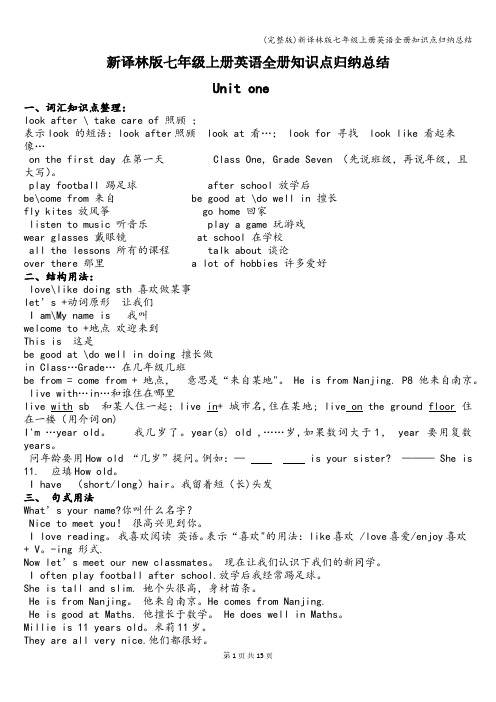
新译林版七年级上册英语全册知识点归纳总结Unit one一、词汇知识点整理:look after \ take care of 照顾 ;表示look 的短语:look after照顾 look at 看…; look for 寻找 look like 看起来像…on the first day 在第一天 Class One, Grade Seven (先说班级,再说年级,且大写)。
play football 踢足球 after school 放学后be\come from 来自 be good at \do well in 擅长fly kites 放风筝 go home 回家listen to music 听音乐 play a game 玩游戏 wear glasses 戴眼镜 at school 在学校all the lessons 所有的课程 talk about 谈论 over there 那里 a lot of hobbies 许多爱好二、结构用法:love\like doing sth 喜欢做某事let’s +动词原形 让我们I am\My name is 我叫welcome to +地点 欢迎来到This is 这是be good at \do well in doing 擅长做in Class…Grade… 在几年级几班be from = come from + 地点, 意思是“来自某地"。
He is from Nanjing. P8 他来自南京。
live with…in…和谁住在哪里live with sb 和某人住一起;live in+ 城市名,住在某地; live on the ground floor 住在一楼(用介词on)I'm …year old。
我几岁了。
year(s) old ,……岁,如果数词大于1, year 要用复数years。
问年龄要用How old “几岁”提问。
七年级上英语译林版知识点

七年级上英语译林版知识点七年级上英语译林版是初中英语教学中的一个重要阶段。
这个阶段的学习内容非常丰富,包括语法、词汇、阅读理解、口语表达等方面。
在学习这个阶段的英语知识点时,我们需要掌握以下几个方面。
一、语法知识点1. 简单现在时简单现在时表示现在发生的动作或状态。
一般情况下,我们在时间状语中使用now、at the moment或者这个时候来表达现在,例如“Now I am reading a book.”2. 一般过去时一般过去时表示过去发生的动作或状态。
一般情况下,我们在时间状语中使用yesterday、last week、last year等词语来表达过去的时间,例如“Yesterday I went to the park.”3. 现在进行时现在进行时表示正在进行的动作,be动词和动词-ing构成,例如“I am reading a book.”4. 一般将来时一般将来时表示将来要发生的事情,一般情况下我们在时间状语中使用 tomorrow、next week 等词语来表达将来时间,例如“I will g o to the cinema tomorrow.”5. 动词不定式动词不定式是动词的一种形式,它在句子中常常用作宾语、表语、宾语补语等,例如“He wants to be a teacher.”二、词汇知识点1. 常用名词常见的名词有person、teacher、student、book、apple、chair、desk、bag等。
2. 常用动词常见的动词有read、write、speak、listen、eat、drink、watch、walk等。
3. 常用形容词常见的形容词有big、small、tall、short、thin、fat、happy、sad 等。
4. 常用副词常见的副词有slowly、quickly、often、never、always、sometimes等。
三、阅读理解阅读理解是英语学习中非常重要的一环,它不仅可以帮助我们理解英语文章,还可以提高我们的英语阅读能力和学习水平。
译林七年级上册英语

译林版七年级上册英语知识点总结一、重点词汇1. good /ɡʊd/:好的。
-例句:She is a good student.(她是一个好学生。
)-用法:可作形容词,修饰名词;也可作名词,意为“好处”。
2. morning /ˈmɔːnɪŋ/:早晨;上午。
-例句:Good morning!(早上好!)-搭配:in the morning(在上午)。
3. hi /haɪ/:嗨;喂。
-例句:Hi! Nice to see you.(嗨!很高兴见到你。
)-用法:用于打招呼。
4. hello /həˈləʊ/:喂;你好。
-例句:Hello! How are you?(你好!你怎么样?)-用法:较为正式的打招呼用语。
5. afternoon /ˌɑːftəˈnuːn/:下午。
-例句:Good afternoon!(下午好!)-搭配:in the afternoon(在下午)。
6. evening /ˈiːvnɪŋ/:晚上;傍晚。
-例句:Good evening!(晚上好!)-搭配:in the evening(在晚上)。
7. fine /faɪn/:健康的;美好的。
-例句:I'm fine, thank you.(我很好,谢谢。
)-用法:可用于回答“How are you?”。
8. thanks /θæŋks/:谢谢。
-例句:Thanks a lot.(非常感谢。
)-用法:相当于“thank you”,较为口语化。
9. this /ðɪs/:这;这个。
-例句:This is a book.(这是一本书。
)-用法:用于介绍近处的人或物。
10. is /ɪz/:是。
-例句:This is a pen.(这是一支钢笔。
)-用法:用于第三人称单数主语之后。
11. my /maɪ/:我的。
-例句:This is my book.(这是我的书。
)-用法:形容词性物主代词,修饰名词。
12. teacher /ˈtiːtʃə(r)/:老师。
七年级英语译林版知识点

七年级英语译林版知识点一、词汇方面。
1. 名词复数。
- 一般情况直接加 -s,像book - books,pen - pens。
但是以s, x, ch, sh结尾的名词,要加 -es,比如box - boxes,bus - buses,watch - watches,dish - dishes。
这就像它们有自己的小规则,要特殊对待。
还有以“辅音字母+y”结尾的名词,要把y变成i再加 -es,像baby - babies。
不过以“元音字母 + y”结尾的就直接加 -s,例如day - days。
- 还有一些不规则的复数形式,像man - men,woman - women,foot - feet,tooth - teeth。
这些就只能死记硬背啦,就像记住一些特别的密码一样。
2. 形容词。
- 形容词可以用来描述名词的特征。
比如big(大的)、small(小的)、tall (高的)、short(矮的)。
形容词有原级、比较级和最高级的变化。
原级就是形容词的本来形式,像“Tom is tall.”。
比较级用于两者之间的比较,一般在形容词后面加 -er,或者前面加more(多音节形容词),例如“Tom is taller than Jack.”或者“This book is more interesting than that one.”最高级用于三者或三者以上的比较,一般加 -est或者前面加the most,像“He is the tallest in our class.”或者“This is the most beautiful flower in the garden.”3. 代词。
- 主格代词有I(我)、you(你/你们)、he(他)、she(她)、it(它)、we (我们)、they(他们/她们/它们)。
主格代词在句子中作主语,就像领导一样,站在句子的前面发号施令。
例如“I like apples.”“He is my friend.”- 宾格代词有me(我)、you(你/你们)、him(他)、her(她)、it(它)、us(我们)、them(他们/她们/它们)。
译林版英语七上知识点汇总

译林版英语七上知识点汇总一、语法1.一般现在时:表示现在经常或习惯性发生的动作或状态。
2.一般过去时:表示过去一些时间发生的动作或状态。
3.一般将来时:表示将来一些时间要发生的动作或状态。
4.现在进行时:表示现在正在进行的动作。
5.过去进行时:表示过去一些时间正在进行的动作。
6.将来进行时:表示将来一些时间正在进行的动作。
7.现在完成时:表示过去发生的一件事对现在造成的影响或结果。
8.过去完成时:表示过去一些时间之前已经完成的动作或状态。
9.情态动词:可以用来表示说话人的态度、意图和推测等。
二、词汇1.数字词和序数词:用于表示数量或顺序的词汇。
2.形容词:用来描述事物的特征或性质的词汇。
3.副词:用来修饰动词、形容词或其他副词的词汇。
4.介词短语:用于表示位置、方向、时间等概念的词组。
5.名词:表示事物的名称或概念的词汇。
6.动词:表示动作或状态的词汇。
7.人称代词:用来代替人的名称的词汇。
8.物主代词:用来表示所属关系的词汇。
9.反身代词:用来表示动作反射到做动作的人身上的词汇。
10.疑问词:用于提问的词汇。
11.连词:用来连接词组或句子的词汇。
三、句式1.倒装句:将助动词或情态动词放在主语之前的句式。
2.肯定句和否定句:表达肯定或否定意思的句子结构。
3.疑问句:用来提问的句子结构。
4.祈使句:表示请求、命令、建议等的句子结构。
5.条件句:表示条件的句子结构。
6.并列句和复合句:由两个或多个句子组成的句子结构。
四、阅读技巧1.标题判断:根据标题预测文章的内容。
2.查找信息:通过关键词在文章中查找所需信息。
3.推理判断:根据文意和逻辑推理完成题目。
4.主旨理解:理解文章的主要内容和中心思想。
5.逻辑推理:根据已知信息进行逻辑推理和推断。
五、听力技巧1.提前预测:根据标题和图片预测听力内容。
2.注意关键词:听力中可能会出现一些关键词,注意听到并理解它们。
3.注意转折词:转折词可以帮助理解听力内容的变化和发展。
译林版英语七年级上册语法知识总结
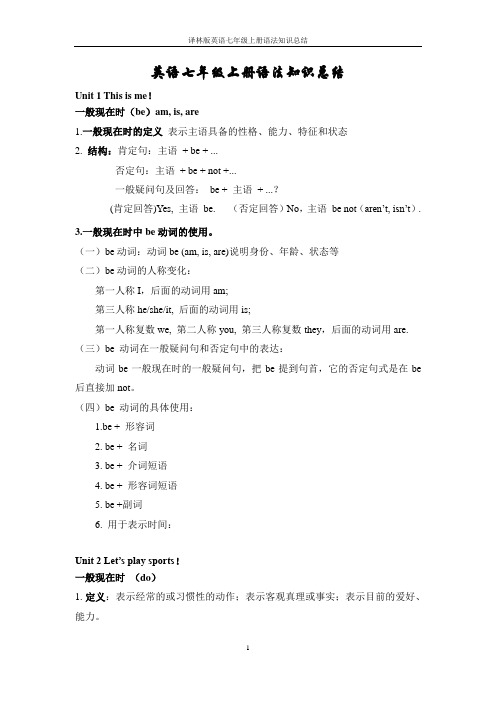
英语七年级上册语法知识总结Unit 1 This is me!一般现在时(be)am, is, are1.一般现在时的定义表示主语具备的性格、能力、特征和状态2. 结构:肯定句:主语+ be + ...否定句:主语+ be + not +...一般疑问句及回答:be + 主语+ ...?(肯定回答)Yes, 主语be. (否定回答)No,主语be not(aren’t, isn’t).3.一般现在时中be动词的使用。
(一)be动词:动词be (am, is, are)说明身份、年龄、状态等(二)be动词的人称变化:第一人称I,后面的动词用am;第三人称he/she/it, 后面的动词用is;第一人称复数we, 第二人称you, 第三人称复数they,后面的动词用are. (三)be 动词在一般疑问句和否定句中的表达:动词be一般现在时的一般疑问句,把be提到句首,它的否定句式是在be 后直接加not。
(四)be 动词的具体使用:1.be + 形容词2. be + 名词3. be + 介词短语4. be + 形容词短语5. be +副词6. 用于表示时间:Unit 2 Let’s play sports!一般现在时(do)1.定义:表示经常的或习惯性的动作;表示客观真理或事实;表示目前的爱好、能力。
2. 常见时间短语:often, sometimes, usually, always, every week, on Sundays, once amonth 等3. 结构:肯定句:主语+V. + ...否定句:主语+ do/ does+ not + V. +...一般疑问句及回答:Do/Does + 主语+ ...?(肯定回答)Yes, 主语do/ does. (否定回答)No,主语do/does not(don’t, doesn’t).4.第三人称单数形式及其变化规则当主语是第三人称单数时,谓语动词要用第三人称单数形式(三单)动词变化规则:(1).规则动词+ s,如makes, eats(2).s,sh,ch, ss, x 结尾+ es,如teaches, misses, fixes, finishes(3).辅音字母+ y结尾,把y 改为ies,如carries, cries(4).特殊变化,如go--- goes, do --- does, have--- hasUnit 3 Welcome to our school!人称代词1. 定义:代替人或物的名词2. 人称代词的主宾格在句子中做的成分(1)人称代词的主格在句子中做主语,一般位于句首。
2024译林版七年级上册英语
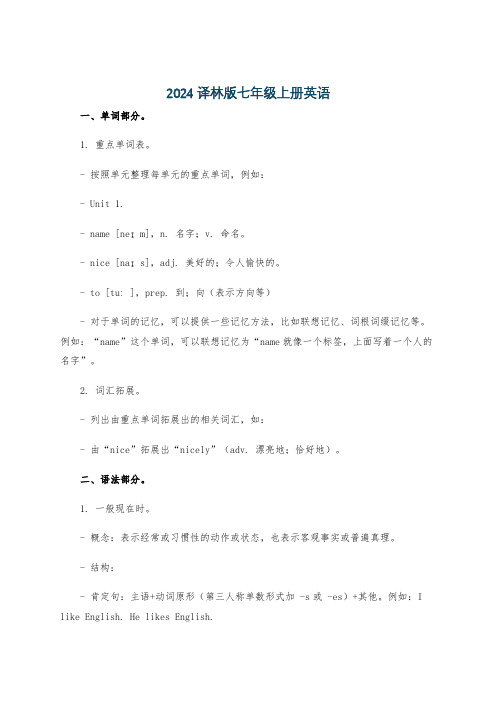
2024译林版七年级上册英语一、单词部分。
1. 重点单词表。
- 按照单元整理每单元的重点单词,例如:- Unit 1.- name [neɪm],n. 名字;v. 命名。
- nice [naɪs],adj. 美好的;令人愉快的。
- to [tuː],prep. 到;向(表示方向等)- 对于单词的记忆,可以提供一些记忆方法,比如联想记忆、词根词缀记忆等。
例如:“name”这个单词,可以联想记忆为“name就像一个标签,上面写着一个人的名字”。
2. 词汇拓展。
- 列出由重点单词拓展出的相关词汇,如:- 由“nice”拓展出“nicely”(adv. 漂亮地;恰好地)。
二、语法部分。
1. 一般现在时。
- 概念:表示经常或习惯性的动作或状态,也表示客观事实或普遍真理。
- 结构:- 肯定句:主语+动词原形(第三人称单数形式加 -s或 -es)+其他。
例如:I like English. He likes English.- 否定句:主语+don't/doesn't+动词原形+其他。
例如:I don't like math. He doesn't like math.- 疑问句:Do/Does+主语+动词原形+其他?例如:Do you like music? Does she like music?- 用法举例:- 描述日常活动:I get up at six o'clock every day.- 陈述客观事实:The sun rises in the east.2. 名词的单复数。
- 规则变化:- 一般情况加 -s,如book - books。
- 以s,x,ch,sh结尾的加 -es,如box - boxes。
- 以辅音字母+y结尾的,变y为i加 -es,如baby - babies。
- 不规则变化:如man - men,foot - feet等。
- 用法:在句子中,根据主语是单数还是复数来决定名词的形式。
译林版英语初一上册语法知识
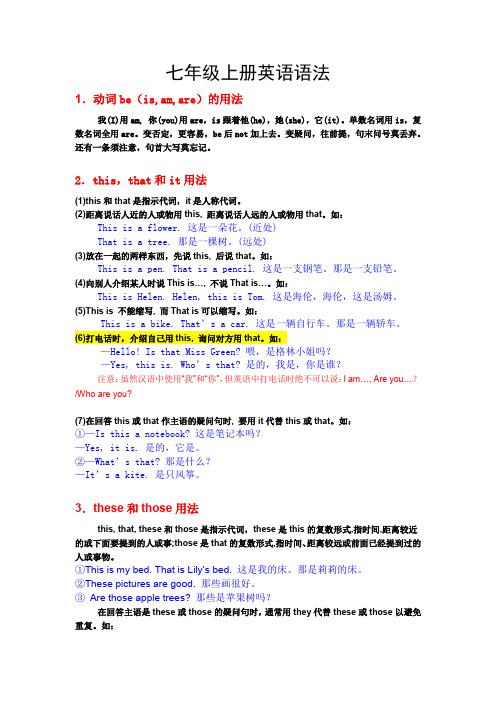
七年级上册英语语法1.动词be(is,am,are)的用法我(I)用am, 你(you)用are,is跟着他(he),她(she),它(it)。
单数名词用is,复数名词全用are。
变否定,更容易,be后not加上去。
变疑问,往前提,句末问号莫丢弃。
还有一条须注意,句首大写莫忘记。
2.this,that和it用法(1)this和that是指示代词,it是人称代词。
(2)距离说话人近的人或物用this, 距离说话人远的人或物用that。
如:This is a flower. 这是一朵花。
(近处)That is a tree. 那是一棵树。
(远处)(3)放在一起的两样东西,先说this, 后说that。
如:This is a pen. That is a pencil. 这是一支钢笔。
那是一支铅笔。
(4)向别人介绍某人时说This is…, 不说That is…。
如:This is Helen. Helen, this is Tom. 这是海伦,海伦,这是汤姆。
(5)This is 不能缩写, 而That is可以缩写。
如:This is a bike. That’s a car. 这是一辆自行车。
那是一辆轿车。
(6)打电话时,介绍自己用this, 询问对方用that。
如:—Hello! Is that Miss Green? 喂,是格林小姐吗?—Yes, this is. Who’s that? 是的,我是,你是谁?注意:虽然汉语中使用“我”和“你”,但英语中打电话时绝不可以说:I am…, Are you…?/Who are you?(7)在回答this或that作主语的疑问句时, 要用it代替this或that。
如:①—Is this a notebook? 这是笔记本吗?—Yes, it is. 是的,它是。
②—What’s that? 那是什么?—It’s a kite. 是只风筝。
3.these和those用法this, that, these和those是指示代词,these是this的复数形式,指时间,距离较近的或下面要提到的人或事;those是that的复数形式,指时间、距离较远或前面已经提到过的人或事物。
七年级上册译林版英语书笔记

七年级上册译林版英语书笔记一、单词。
1. 重点单词。
- this:这个,是指示代词,用于指代离说话者较近的人或物。
例如:This is my book.(这是我的书。
)- that:那个,也是指示代词,用于指代离说话者较远的人或物。
例如:That is his pen.(那是他的笔。
)- I:我,是主格形式,在句子中作主语。
例如:I am a student.(我是一名学生。
)- you:你,你们,既可以作主格也可以作宾格。
作主语时,如You are my friend.(你是我的朋友。
)作宾语时,如I like you.(我喜欢你。
)- he:他,主格形式。
例如:He is a good boy.(他是一个好男孩。
)- she:她,主格形式。
例如:She is my sister.(她是我的妹妹。
)- it:它,主格和宾格同形。
可以指代动物、植物或无生命的物体等。
例如:It is a cat.(它是一只猫。
)- name:名字,名词。
例如:What's your name?(你叫什么名字?)- to:到,向,是介词。
例如:Welcome to our school.(欢迎来到我们的学校。
)- meet:遇见,相逢,动词。
例如:Nice to meet you.(很高兴见到你。
)- too:也,还,副词。
例如:I like English, too.(我也喜欢英语。
)- your:你的,你们的,形容词性物主代词。
例如:Your book is very interesting.(你的书很有趣。
)- his:他的,形容词性物主代词。
例如:His name is Tom.(他的名字是汤姆。
)- her:她的,形容词性物主代词。
例如:Her hair is long.(她的头发很长。
)2. 词汇拓展。
- classmate:同学,由class(班级)+mate(伙伴)组成。
- teacher:教师,动词teach(教)的名词形式,以 -er结尾表示从事某种职业的人。
初一英语笔记上册译林版
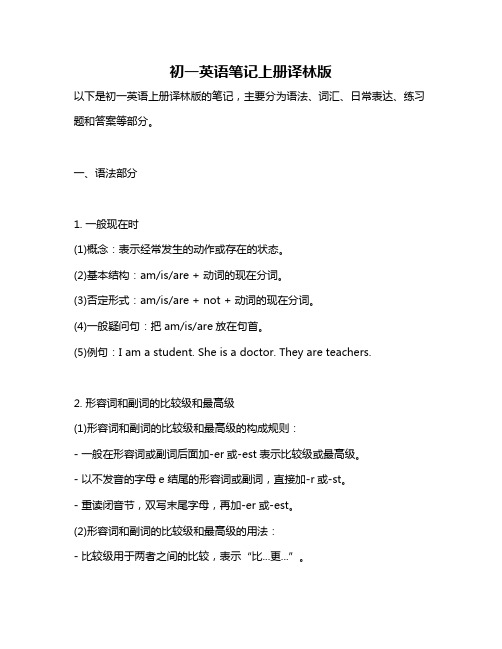
初一英语笔记上册译林版以下是初一英语上册译林版的笔记,主要分为语法、词汇、日常表达、练习题和答案等部分。
一、语法部分1. 一般现在时(1)概念:表示经常发生的动作或存在的状态。
(2)基本结构:am/is/are + 动词的现在分词。
(3)否定形式:am/is/are + not + 动词的现在分词。
(4)一般疑问句:把am/is/are放在句首。
(5)例句:I am a student. She is a doctor. They are teachers.2. 形容词和副词的比较级和最高级(1)形容词和副词的比较级和最高级的构成规则:- 一般在形容词或副词后面加-er或-est表示比较级或最高级。
- 以不发音的字母e结尾的形容词或副词,直接加-r或-st。
- 重读闭音节,双写末尾字母,再加-er或-est。
(2)形容词和副词的比较级和最高级的用法:- 比较级用于两者之间的比较,表示“比...更...”。
- 最高级用于三者或三者以上的比较,表示“最...”。
- 表示比较级的常用句型:主语+谓语+比较级+than+宾语。
- 表示最高级的常用句型:主语+谓语+the+最高级+of/among+宾语。
(3)例句:She is taller than me. This book is the most interesting of the three.二、词汇部分1. 表示家庭成员的词汇:- 父亲:father- 母亲:mother- 哥哥:older brother- 姐姐:older sister- 弟弟:younger brother- 妹妹:younger sister2. 表示职业的词汇:- 教师:teacher- 医生:doctor- 警察:policeman (policewoman)- 护士:nurse3. 表示性格特征的形容词:- 聪明的:clever- 友好的:friendly- 有趣的:funny- 慷慨的:generous4. 表示感觉和情绪的词汇:- 高兴的:happy- 生气的:angry- 伤心的:sad- 惊讶的:surprised。
(完整版)新译林版七年级上册英语全册知识点归纳总结
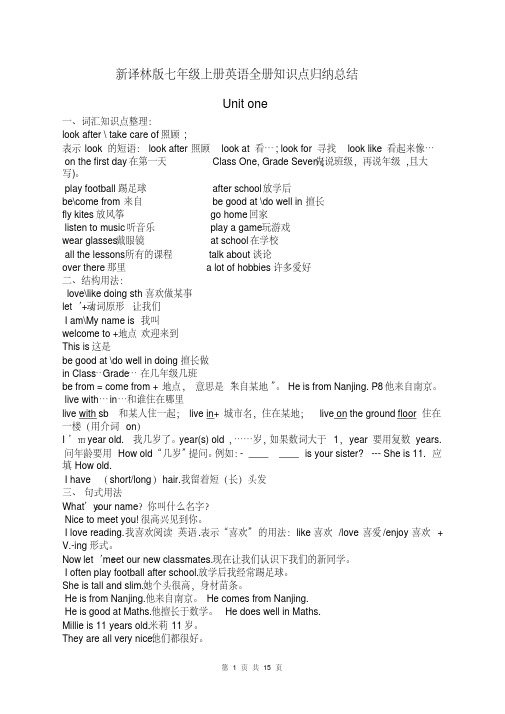
新译林版七年级上册英语全册知识点归纳总结Unit one一、词汇知识点整理:look after \ take care of 照顾 ;表示look 的短语:look after照顾look at 看…; look for 寻找look like 看起来像…on the first day 在第一天Class One, Grade Seven (先说班级,再说年级,且大写)。
play football 踢足球 after school 放学后be\come from 来自be good at \do well in 擅长fly kites 放风筝go home 回家listen to music 听音乐play a game 玩游戏wear glasses 戴眼镜at school 在学校all the lessons 所有的课程 talk about 谈论over there 那里 a lot of hobbies 许多爱好二、结构用法:love\like doing sth 喜欢做某事+动词原形让我们let’sI am\My name is 我叫welcome to +地点欢迎来到This is 这是be good at \do well in doing 擅长做in Class…Grade…在几年级几班be from = come from + 地点, 意思是“来自某地”。
He is from Nanjing. P8 他来自南京。
live with…in…和谁住在哪里live with sb 和某人住一起;live in+ 城市名,住在某地;live on the ground floor 住在一楼(用介词on)I’m…year old. 我几岁了。
year(s) old ,……岁,如果数词大于1,year 要用复数years. 问年龄要用How old “几岁”提问。
例如:- is your sister? --- She is 11. 应填How old.I have (short/long)hair.我留着短(长)头发三、句式用法your name?你叫什么名字?What’sNice to meet you! 很高兴见到你。
- 1、下载文档前请自行甄别文档内容的完整性,平台不提供额外的编辑、内容补充、找答案等附加服务。
- 2、"仅部分预览"的文档,不可在线预览部分如存在完整性等问题,可反馈申请退款(可完整预览的文档不适用该条件!)。
- 3、如文档侵犯您的权益,请联系客服反馈,我们会尽快为您处理(人工客服工作时间:9:00-18:30)。
7年级上册语法总结
Unit 1 动词be 得一般现在时
1、表示一种事实:
He is 11 years old 、她11岁了。
I am from China 、我来自中国。
2、表示一种状态(经常存在):
He goes fishing every weekend 、她每个周末都去钓鱼。
We usually go to school at 7:00、我们通常7点上学。
3、Be 动词与主语保持一致:
I am a teacher 、
He/She is a worker 、 It is a little dog 、 They/We/You are dancers 、
Be 动词变化遵循原则,口诀:我就是am,您就是are,is 用于她、她、它,复数都就是are 、
4、主语就是第三人称单数时,动词得变化:
①一般都+s 例如
②
例如③例如④ 5①、~She is not in the kitchen 、 、~They are not in the classroom 、
②She is in the kitchen ~Is she in the kitchen?——Yes,she is 、
——No,she isn ’t 、 They are in the classroom 、~Are they in the classroom ? ——Yes,they are 、
——No,they aren ’t 、
、句型转换
①否定句:do+not/does +not
You don’t go to school on Sunday、 He doesn’t work in this shop、
②句首添加do/does
Do you play basketball after school? Does John speak Chinese?
Unit 3 人称代词
1、我们常用人称代词表示人或物
、主格在句中做主语,一般用在动词前
宾格在句中做宾语,一般用在动词、介词后
4、有好几个人称代词并列出现时,顺序如下:
单数:231原则——you、he and I
复数:123原则——we、you and they
always>usually>often>sometimes>seldom>never
when与what time得区别
What time询问得就是具体时间,when可以就是具体时间也可以就是大体时间。
Unit 6 可数、不可数名词
可数名词:可以计数得名词
不可数名词:不可以计数得名词
可数名词:1、前面可以用不定冠词a/an修饰
前面可以用数词修饰,one、two、three、、、、、、
前面可以用some、any修饰
不可数名词:
1、借助表示数量得单位来表示:a piece of/two pieces of
2、不能被a/an修饰
3、做主语时,谓语动词用单数:The food is delicious、
Unit 7 some/any/there be
1、some、any 一些
Some一般用在肯定句中。
There are some birds in the tree、(on the
tree 就是长在树上)
Any一般用在否定句、疑问句中。
Do you have any questions?
2、特殊情况:some可以用在疑问句中,表达“建议、请求、邀请”
并希望得到对方得肯定回答
Would you like some tea?
Can I have some oranges?
3、there be句型,表示“某地有某物或某人”
There就是引导词,本身没有词义
得形式变化遵循“就近原则”,即与其最近得主语保持一致。
There is a boy, a girl and two women in the house、
There are ten students and a teacher in the classroom、
表示某人正在做某事
1、now、look、listen等表示现在得词语出现时,用现在进行时
He is playing football now、
Look, Miss Wang is having an English lesson、
Listen, she is singing!
2、句子构成: 主语+be动词+v-ing
He(主语) is(be动词) playing(v-ing) football now、。
